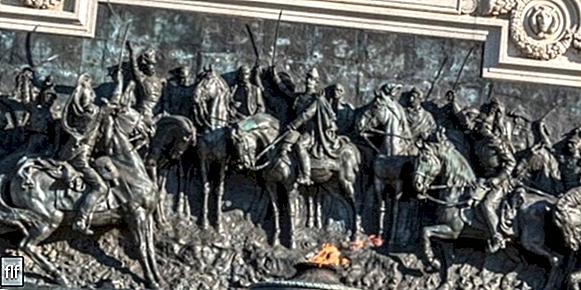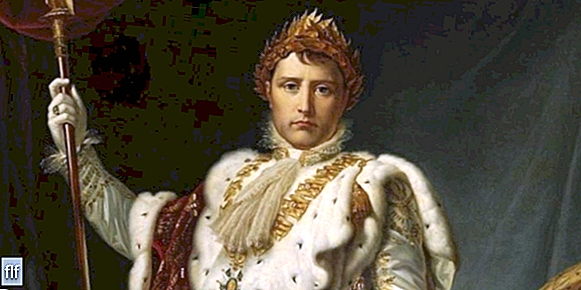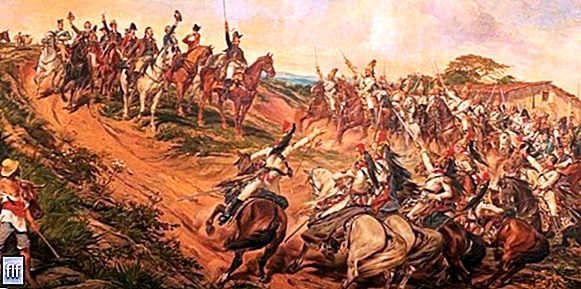- When and how was the independence of Brazil?
- Characteristics of the independence of Brazil
- Causes of the independence of Brazil
- The Brazilian independence process
- Brazilian War of Independence
- Consequences of the independence of Brazil
- brazil independence day
We explain how the independence process in Brazil was, its causes and consequences. Also, how was the War of Independence.

When and how was the independence of Brazil?
The existence of Brazil as a nation independence took place at the beginning of the 19th century, specifically between the years of 1821 and 1824, as a result of a series of conflicts between Brazil, which had been Suburb since the 16th century, and the Portuguese crown, under the command of King John VI of Portugal, nicknamed “el clemente”.
As in the independence processes of the rest of Latin America that occurred at the same time, independence of Brazil was initially triggered by discrepancies in the management of economic relations between colony and metropolis, and by the invasion of the Iberian Peninsula by Napoleon Bonaparte's troops.
However, unlike the Spanish-American independences, the Brazilian one was not as long and bloody, nor did it lead to the establishment of a republic democratic. On the contrary, it was established constitutional monarchy of a liberal spirit, known as the Empire of Brazil, whose ruler de facto was the crown prince to the Portuguese crown, Pedro I.
For its part, the Brazilian War of Independence took place between 1822 and 1824, pitting supporters of Pedro I and of the separation of Brazil from the then United Kingdom of Portugal, Brazil and the Algarve, against troops loyal to the Kingdom of Portugal and to the order hitherto instituted.
It was a war brief and with minor confrontations, which culminated in the recognition by the Kingdoms of Great Britain and Portugal of Brazilian sovereignty, which formally occurred in 1825, after the signing of an agreement in which the new South American nation committed itself to to compensate the damages caused to both crowns and to grant the English advantages in their commercial relations.
Characteristics of the independence of Brazil
The Brazilian independence process was characterized by the following:
- It was much less bloody than the process in neighboring Latin American nations, although it was not exempt from violence. In addition, it was led by a member of the Portuguese royal family, Crown Prince Pedro I, who subsequently became Emperor of Brazil.
- It took place between 1821 and 1824, but its antecedents can be traced back to 1808, after the installation of the Portuguese royal authorities in Brazil, fleeing from the Napoleonic invasion in Europe.
- The Braganza dynasty of Portugal played a decisive role in the process, since the independence side was led by Prince Pedro I, in charge of power by instruction of his father John VI, who had then been forced to return to Portugal. Likewise, the influence of Great Britain was important in the recognition of independent Brazil.
- Its culminating stage was marked by the Brazilian War of Independence, which took place between February 18, 1822 and March 8, 1824. Brazilian independence, however, is celebrated every September 7, commemorating the so-called Grito de Ipiranga, formal declaration of independence.
Causes of the independence of Brazil

The Napoleonic invasion forced the kings of Portugal to flee to their colonies.
The independence of Brazil had the following causes and background:
- The Napoleonic invasion of the Iberian Peninsula at the beginning of the 19th century forced the kings of Portugal to flee to their colonies and install the control of the Portuguese Empire there. This rarefied the relationship between colony and metropolis.
- The rise of Brazil as a kingdom part of the United Kingdom of Portugal, Brazil and the Algarve, made by Juan VI in 1815, who also appointed the crown prince Pedro I as regent of the new Kingdom of Brazil. These events seeded a identity own policy in the Brazilian inhabitants.
- The political instability in the Portuguese Empire as a result of the outbreak of the Porto Revolution in 1820, thanks to which the Cortes met to create the first Constitution of the Kingdom of Portugal. These same courts demanded the return of King John VI to the peninsula in 1821 and abolished the regency of Pedro I in Brazil, in an attempt to recolonize the now American kingdom. This drove the prince's loyalties towards the independence cause.
The Brazilian independence process
The Brazilian independence process began in 1821, when John VI returned to Portugal, leaving his son as regent of the kingdom of Brazil, since a clear secessionist sentiment was already in the air at that time. Thus, the king commissioned his son Pedro to remain in America and instructed him to lead any independence movement, so that his lineage would remain in power.
Shortly after, an express order arrived from the metropolis from the Lisbon Courts, which terminated the regency in Brazil and requested the return to Portugal of the crown prince. This unleashed new tensions and discontent in Brazil, since it went from being a kingdom that participated in the United Kingdom of Portugal, Brazil and the Algarve, to once again being an American colony. So, at the beginning of 1822, Don Pedro Braganza received a petition with more than 8,000 signatories asking him to stay in Brazil.
Then, the future emperor of Brazil announced to his followers that: “As it is for the good of all and happiness geral da Nação, I'll be here soon. Say ao povo que fico”, in Spanish: “If it is for the good of all and the general happiness of the nation, I am ready. Tell the people that I remain." This act of disobedience was an important step in the consolidation of independence sentiments in Brazil.
This unleashed the first clashes between politicians loyal to the Portuguese crown and those who preferred the government of Don Pedro Braganza. The latter, faced with the massive resignation of opposition deputies, formed a new government together with José Bonifacio de Andrada e Silva, who was later known as the "Patriarch of independence."
Don Pedro and Andrada e Silva called for a Constituent Assembly. In addition, they announced that the instructions issued by the Portuguese Courts would only be followed in Brazil if they had the express approval of Don Pedro. Something that was already equivalent to independence in political practice. The Cortes, in response, declared the Constituent Assembly of Brazil, the government of the Prince Regent, illegitimate and requested its immediate return to Portuguese territory.
Upon learning of this, being on the banks of the Ipiranga River on September 7, 1822, Don Pedro announced the formal severing of the ties that united them with Portugal, invited them to remove their bracelets and, after unsheathing his sword, proclaimed the " independence or death. This event is known as the Cry of Ipiranga, and marks a point of no return in the independence of Brazil.
The definitive separation took place on September 22, in a letter addressed by Don Pedro to his father Juan VI in Portugal. On October 12, Pedro I was proclaimed Emperor, thus formally beginning the Empire of Brazil, in the midst of the War of Independence.
Brazilian War of Independence

The Brazilian War of Independence was brief, and consisted mainly of minor clashes, without gigantic bloodshed. Its first moments took place with the mutiny of some 2,000 Portuguese soldiers (prickly pear or “lead feet”, as they were nicknamed) against the government of don Pedro in the city of Rio de Janeiro, where the seat of the Portuguese government had been located during the stay of Juan VI.
Surrounded by 10,000 armed Brazilians, these 2,000 soldiers had no choice but to accept the prince's invitation to leave the city and return to Portugal, thus avoiding bloodshed. The soldiers delayed their departure, waiting for the reinforcements that came from the metropolis, but when they arrived they were not allowed to disembark, so the Portuguese troops had to leave without resistance.
The clashes did not end there. The Brazilian political situation was complicated, since not all citizens they agreed with the idea of independence, or not in the same terms that were being proposed in 1822. There were clashes in Pernambuco and especially in San Salvador de Bahía, a city that was under the command of the Portuguese and rejected the authority of Río de janeiro.
Minas Gerais and São Paulo, on the other hand, added troops to the independence cause, as did the Freemasons, enthusiastic about the possibility of a new parliamentary government.
Dom Pedro proclaimed himself "perpetual defender of Brazil" in May and called for treating the Portuguese forces as enemies, and soon won the Portuguese provinces of Piauí and Maranhão to his cause. In addition, he hired the English admiral Thomas Alexander Cochrane, in command of Chile's forces against Spain, and the Frenchman Pierre Labatut, who had fought alongside the Gran Colombiano army.
Already in 1823 the situation of the Portuguese troops was desperate. Then came the news from the metropolis of the dismissal of the Lisbon Cortes after an absolutist revolt in Portugal, reinstating the absolutism under John VI. With no hope of receiving reinforcements, the Portuguese soldiers led by General Inácio Luís Madeira de Melo abandoned San Salvador de Bahia and began their retreat towards Portugal, leaving the city in the hands of the independentistas.
After successive independence victories in Pernambuco, Maranhão and Pará, the War of Independence was practically won. Soon the rest of Brazil was joining the newly founded Empire, and the conflicts ended throughout 1824.
On August 18, 1825, the Empire of Brazil was formally recognized by Great Britain and Portugal, in exchange for the payment of 1.4 million pounds sterling to the former and 600,000 pounds sterling to the latter, in addition to the renunciation of any future annexation of the Portuguese colonies. in Africa and to put an end to the business of the slave trade, although the latter did not mean the end of the slavery in the Brazilian territory.
Consequences of the independence of Brazil
Brazilian independence had the following consequences:
- The proclamation of the Empire of Brazil, a monarchy independent constitutional rule under Pedro I, which lasted until 1889. This monarchy had a certain liberal spirit, but at the same time preserved other colonial elements, such as the slavery of Africans.
- The recognition of Brazil by Great Britain and Portugal had a high economic cost, given that the new Empire agreed to indemnify the British and Portuguese crowns, assuming an important external debt.
- The War of Independence was brief and not bloody, which led the Empire of Brazil to plan territorial expansions towards the Eastern Band of the Río de la Plata, thus laying the foundations for the War of Brazil (1825-1828) that culminated in the proclamation of Uruguay as an independent nation.
brazil independence day
In Brazil, national independence is celebrated every September 7, commemorating the Cry of Ipiranga, considering it the day that Pedro I formally broke his relations of submission with the Portuguese crown.
